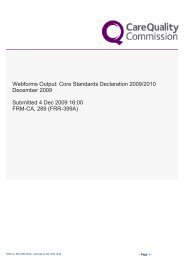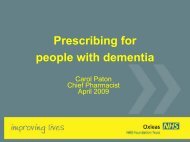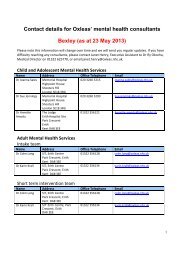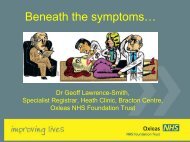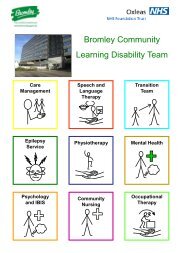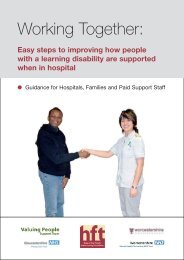Complex patients - Dr. Alan Cohen FRCGP 247.5 KB
Complex patients - Dr. Alan Cohen FRCGP 247.5 KB
Complex patients - Dr. Alan Cohen FRCGP 247.5 KB
You also want an ePaper? Increase the reach of your titles
YUMPU automatically turns print PDFs into web optimized ePapers that Google loves.
<strong>Complex</strong> <strong>patients</strong><strong>Dr</strong> <strong>Alan</strong> <strong>Cohen</strong> <strong>FRCGP</strong>
What this presentationis not…It is not about being deep and meaningfulIt is not telling you what toIt is not telling how bad you are
What this presentationis (hopefully) going todoGive you some information about the sizeand implications of medically unexplainedsymptomsShow how primary care are the best peopleto deliver care for these peopleWhy practice based commissioning offersthese people the best options
General PracticeDisorganised/ChaoticPoor at identifying people with mental heathproblemsNot interested in mental health
General Practice280 million consultations annually30% have a mental health component91% of all mental health problems aremanaged entirely in primary care25% of people with severe mental healthproblems are managed entirely in primarycare
General PracticeThe art of general practice is “organising thechaos of the first presentation”People usually present with somaticsymptomsA more acceptable ticket of entryEasier to explainStigmaDifficult sometimes to distinguish apsychological cause from a physical cause
General PracticeDistinguishing between physical andpsychological problems takes timeGetting it right is important…if we don’tThe patient and the doctor are both dissatisfiedThe wrong patient is getting the wrong treatmentin the wrong place from the wrong doctorIt costs moneyMedically unexplained symptoms (MUS)
But…There is always a fear of missing a significantunderlying medical conditionNot all referrals are a bad idea!It requires excellent consultation skills fromthe GPIt requires a primary care approach, not apsychiatrist!
How Common are MUS inprimary care?There is a large literaturelooking at medicallyunexplained symptoms(MUS) in Primary Care;the table summarises 14papers•20% of all attendeeshave some disability•5% have severedisabilityFeder et al 24%Mumford 5% to 10%Pevelar 19%Palsson 16%Pilowsky 39%Sciccicchitano 27%Kroenke 74%Khan 34%Kroenke 35%Marple 33%Kroenke 20%De Waal 21.9% to 16.1%Barsky 20.5%
How Common are MUS insecondary care?Prevalence of MUS in acute out <strong>patients</strong> ina London Teaching HospitalClinic %• Chest 59%• Cardiology 56%• Gastroenterology 60%• Rheumatology 58%• Neurology 55%• Dental 49%• Gynaecology 57%
The cost?How much does your PCT spend on theseout-patient departments?Is this money well spent?
How costly is the Problem?•Barsky estimates$256 BILLIONannually in the USA•Hiller et al found 2.2times the spend onpeople in this groupReid estimatedeach case cost £955per MUS patient(2002 figures - pretariff)
In Bexley…Population 218,000Assume 66% are over 18 and under 65143,880Assume national tariffsAssume that national referral rates applyAssume that each patient has 3.2 F/u appts
In Bexley…SpecialtyCardiologyDentalGastroenterologyGeneral MedicineGynaecologyNeurologyRheumatologyThoracicNo. with MUS562532476461913420273150Cost (£)£281,722£18,786£104,684£324,024£742,784£210,436£162,250£82,281More informationPBC Economic Assessment.xls?
What about primarycare costs?Assume that 20% of attendees will have MUSAssume that 12.3% will be interested intreatmentAssume that 4.8% will still be symptomatic at6 monthsAssume that the cost of a consultation is£34.00
What about primarycare costs?Assume that people with MUS consult twiceas frequently as othersAssume that 60% of the those who wanttreatment, and are still symptomatic at 6months respondSaves 10,938 consultations in primary care
How many <strong>patients</strong> arethere is your practicewith MUS?Nottingham Medical School have delivered acommissioning tool for practice basedcommissionersIt is NOT validated to identify individualsIt uses the practice data base to identifypeople who are likely to have MUS
How many?Factors includedAgeChronic fatigueLife stressLong term illnessNegative ESRAnti-depressantsZ= -1.9269 + -0.0292(X 1 ) + 1.7709(X 2 )+0.6125(X 3 ) + 0.8156(X 4 ) + 0.8648(X 5 ) +0.9476(X 6 )
How many severe<strong>patients</strong>?FactorsAgeAnti-depressants<strong>Dr</strong>ynessObesitySleep problemsNegative ESRLife stressAsthmaZ= -3.3399 + -0.0106(X 1 ) + 1.2742(X 2 ) + 0.9175(X 3 ) + -0.7362(X 4 ) + 0.6755(X 5 ) +1.1049(X 6 ) + 1.1388(X 7 ) +0.5055(X 8 )
What worksCBTAntidepressantsCollaborative careReattribution?Keeping the patient in primary carehttp://www.mhchoice.csip.org.uk/silo/files/mus-review-forpathfinders.pdf
CBTHiller et al looked at cost effectiveness of CBT ina group of people at a tertiary care centre, at a2 year follow up they found a treatment relatedoffset of €382 (-24.5%) for outpatient care and€1098 (-36.7%) for inpatient care.In a subgroup of somatising high users perpatient savings of €32,174 were achieved.
<strong>Dr</strong>ugsA meta analysis ofantidepressanttreatment showedbenefit in 69% ofstudies.
ReattributionInitial trials promising,showing a 15% drop intotal healthcare costsA trial in press by oneof the developers of thetreatment is lesspromising
Collaborative careCollaborative care is a combination of training andpsychiatric consultation / support for primary care.Van der Felz-Cornelius showed that collaborativecare was more effective than training alone, withhighly significant reductions43% of care as usual for primary care service use11.6% of the care as usual group for ‘care in allhealth care settings’
Primary CareExcellent consultation skillsThe key is to introduce stepped, collaborative, careScreen out undiagnosed depression and anxiety,and somatisationProvide a logical pathway for these <strong>patients</strong>Provide a collaborative care support offering CBTSupport PC when it goes wrong
Don’t forgetThose with Long Term ConditionsDiabetesIschaemic heart diseaseCOPDPsychological treatment can improve thesegroups as wellThere are significant savings to be made
Thank you<strong>Alan</strong>.cohen@scmh.org.uk





